... newer stories
Dienstag, 5. Juli 2022
YouTube Channel and Discord Server
peacecamp, 11:38h
Please visit our brandnew YouTube Channel, where you can rewatch all the documentaries by Gerald Muthsam of the years 2008-2019, as well as the legendary shows4peace (not to brag) staged by AnnPhie Fritz (writer and director) & Lukas Hauptfeld (musical supervision) with the incredibly talented ambassadors of peace in Dschungl Vienna 2014-2019 and so much more:
https://www.youtube.com/channel/UCCQFTPJUqYFXqYh04imuNiA
And if you happen to have taken part in a peacecamp or our peacecamp conference, then please join uns on discord to plan future projects and keep up the work as ambassadors of peace!
https://discord.gg/HDH94Jd2Vx
https://www.youtube.com/channel/UCCQFTPJUqYFXqYh04imuNiA
And if you happen to have taken part in a peacecamp or our peacecamp conference, then please join uns on discord to plan future projects and keep up the work as ambassadors of peace!
https://discord.gg/HDH94Jd2Vx
(0 Kommentare) ... comment
European Year of Youth 2022
peacecamp, 11:36h
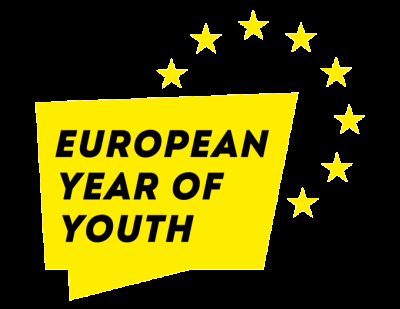
The European Union supports in the year of youth 2022 projects by and for young people, who want to get involved in shaping the(ir) society/ies.
https://ejj2022.de/
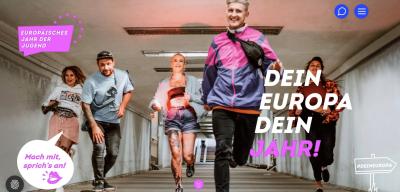
(0 Kommentare) ... comment
A short history of peacecamp
peacecamp, 10:41h
This text is part of our ambassadors of peace exhibition and was written by AnnPhie Fritz for the peacecamp museum:
The history of peacecamp begins in the year 2000, with the second Intifada. Evelyn Böhmer-Laufer was fed up with feeling powerless in the face of horrible news.
Her initial idea was to give young people a break from war, send them on a holiday to Austria, where they could meet each other in a different context, maybe learn how to ski?
Evelyn and her husband Ronaldo Böhmer weighed different ideas against each other. Finally, Evelyn found an accomplice in Israel, who had been thinking in a similar direction. Joining their visions, Nilli Gross and her came up with the concept for their ?identity-peacecamp?.
During the summer holidays,
three groups of pupils came together in the quiet municipality of Rechberg, Carinthia. ?It was about sharing solutions to shared problems, as well as getting to know and respecting the position of ?the other? and finding a non-violent approach to conflicts. During their many talks, the teenagers had opportunities to fathom their individual social, religious and cultural identities and to convey their socio-cultural heritage.?, Mag. Böhmer-Laufer writes in her report for the newspaper Hagalil ́s website.
The focus on identity was central to Böhmer-Laufer and Gross. As a psychologist, Böhmer-Laufer knows how trauma can be inherited throughout generations, inscribed in the very identities of children, even after a conflict is apparently long solved. Fear and as a result animosities are woven so deeply into the complex fabric that is a human personality, that letting go of them can be overwhelming. Especially
when a conflict is ongoing and one is expected to choose sides. In spring 2005, the three groups met again in what has ever since been the only peacecamp held in Israel.
Two things became clear after the first peacecamp: It had to happen again and there was a need for a fourth delegation. Thinking about Austria ́s past as a country bordering the Soviet Union, with families
separated by the Iron Curtain, the thought arose to invite a delegation from an Eastern European country. It was also an example of a solved conflict - what was once separated had become united by the European Union. The third peacecamp took place in Rechberg with a fourth delegation from Slovenia.
In 2006, after four peacecamps hosted by the organization Hadassah-Austria, Evelyn and Ronny founded their own association, the ?Verein zur Förderung der politischen Mündigkeit -4peace? (Association for promoting political maturity -4peace). Without the support from Hadassah, the
European Union, the Austrian ministry for education and many other sponsors, peacecamp project would have never been possible. 2006 ́s peacecamp was held in Franzen, with an Austrian, a Palestinian, an Israeli -and for the first time- a Hungarian delegation. This has been the setup all throughout the years until 2019.
During those years, the locations changed twice. 2007-2013, when peacecamp took place in Reibers, near the Tcheque border, it would include a one day trip to the site of the iron curtain. It was a sign of hope to see how borders could become obsolete and everyone was allowed to move freely.
From 2014
on, peacecamps were held in Lackenhof/ Ötscher. Different peacecamps also had different names, focusing on topics all around the main goal of peace. Unfortunately, the political developments of the past years have made it more than clear that
peace can never be taken for granted.
The project aimed to adress the concerns of the young adults (and the grown-ups) who felt, once again, powerless in the face of such drastic developments. 2016-2019 the Austrian delegation included
teenagers who were seeking asylum in Austria. Half of them had their applications denied and were deported to their countries of origin once they turned 18. With some of them there is still contact and ongoing support. The Israeli-Palestinian conflict is far from being solved and Europe is struggling to keep its image as a ?safe-haven?. During the past years, laws have become more and more restrictive towards immigration politics, leaving those who have to flee conflicts and poverty to die at its doorstep. Right-wing parties gain more popularity, tempering with the freedom of press and women ́s rights, threatening LGBTQIA+ people and leading to violence both against jewish and muslim people, as well as the Rom*nja and Sinti*zze communites. European countries keep temporarily reinstating border controls for various reasons. The effects of the climate crisis are starting to have a real impact on everyday lives, even in rich countries and just when you thought things could not get worse after two years of pandemic, that stopped life around the globe in its tracks -including the peacecamp project - a war erupted in Europe. So much for the conflict between the former Soviet Union and Europe being long solved. Peace is never granted.
After the second year without peacecamp due to the pandemic, Böhmer-Laufer and her husband decided to retire from the peacecamp project. Their daughter Lia Böhmer, who has grown together with
the project, as participant, helping hand and workshop leader throughout the years is now taking over together with AnnPhie Fritz and Lukas Hauptfeld, who have been a core part of peacecamp since 2014. Since they keep running the association 4peace, Evelyn and Ronny will remain present and help to restart the project.
Why do we want to keep this project alive, even though things look so grim?
Precisely because of that. Because peacecamp is a safe-space, a micro-cosmos of idealism and activism, a promise that any conflict can be talked about, because we will not leave each other, even if
we are mad. We will be here tomorrow to pick up where we left off yesterday. Peacecamp is about more than workshops, about more than cultures, art or team-building. It happens in the corridors after curfew, in the small alliances that are being formed against certain activities or when sleepily walking to breakfast. Peacecamp lives in the minds of and friendships between the participants, young people becoming adults in these testing times. And for them, we keep doing this.
The history of peacecamp begins in the year 2000, with the second Intifada. Evelyn Böhmer-Laufer was fed up with feeling powerless in the face of horrible news.
Her initial idea was to give young people a break from war, send them on a holiday to Austria, where they could meet each other in a different context, maybe learn how to ski?
Evelyn and her husband Ronaldo Böhmer weighed different ideas against each other. Finally, Evelyn found an accomplice in Israel, who had been thinking in a similar direction. Joining their visions, Nilli Gross and her came up with the concept for their ?identity-peacecamp?.
During the summer holidays,
three groups of pupils came together in the quiet municipality of Rechberg, Carinthia. ?It was about sharing solutions to shared problems, as well as getting to know and respecting the position of ?the other? and finding a non-violent approach to conflicts. During their many talks, the teenagers had opportunities to fathom their individual social, religious and cultural identities and to convey their socio-cultural heritage.?, Mag. Böhmer-Laufer writes in her report for the newspaper Hagalil ́s website.
The focus on identity was central to Böhmer-Laufer and Gross. As a psychologist, Böhmer-Laufer knows how trauma can be inherited throughout generations, inscribed in the very identities of children, even after a conflict is apparently long solved. Fear and as a result animosities are woven so deeply into the complex fabric that is a human personality, that letting go of them can be overwhelming. Especially
when a conflict is ongoing and one is expected to choose sides. In spring 2005, the three groups met again in what has ever since been the only peacecamp held in Israel.
Two things became clear after the first peacecamp: It had to happen again and there was a need for a fourth delegation. Thinking about Austria ́s past as a country bordering the Soviet Union, with families
separated by the Iron Curtain, the thought arose to invite a delegation from an Eastern European country. It was also an example of a solved conflict - what was once separated had become united by the European Union. The third peacecamp took place in Rechberg with a fourth delegation from Slovenia.
In 2006, after four peacecamps hosted by the organization Hadassah-Austria, Evelyn and Ronny founded their own association, the ?Verein zur Förderung der politischen Mündigkeit -4peace? (Association for promoting political maturity -4peace). Without the support from Hadassah, the
European Union, the Austrian ministry for education and many other sponsors, peacecamp project would have never been possible. 2006 ́s peacecamp was held in Franzen, with an Austrian, a Palestinian, an Israeli -and for the first time- a Hungarian delegation. This has been the setup all throughout the years until 2019.
During those years, the locations changed twice. 2007-2013, when peacecamp took place in Reibers, near the Tcheque border, it would include a one day trip to the site of the iron curtain. It was a sign of hope to see how borders could become obsolete and everyone was allowed to move freely.
From 2014
on, peacecamps were held in Lackenhof/ Ötscher. Different peacecamps also had different names, focusing on topics all around the main goal of peace. Unfortunately, the political developments of the past years have made it more than clear that
peace can never be taken for granted.
The project aimed to adress the concerns of the young adults (and the grown-ups) who felt, once again, powerless in the face of such drastic developments. 2016-2019 the Austrian delegation included
teenagers who were seeking asylum in Austria. Half of them had their applications denied and were deported to their countries of origin once they turned 18. With some of them there is still contact and ongoing support. The Israeli-Palestinian conflict is far from being solved and Europe is struggling to keep its image as a ?safe-haven?. During the past years, laws have become more and more restrictive towards immigration politics, leaving those who have to flee conflicts and poverty to die at its doorstep. Right-wing parties gain more popularity, tempering with the freedom of press and women ́s rights, threatening LGBTQIA+ people and leading to violence both against jewish and muslim people, as well as the Rom*nja and Sinti*zze communites. European countries keep temporarily reinstating border controls for various reasons. The effects of the climate crisis are starting to have a real impact on everyday lives, even in rich countries and just when you thought things could not get worse after two years of pandemic, that stopped life around the globe in its tracks -including the peacecamp project - a war erupted in Europe. So much for the conflict between the former Soviet Union and Europe being long solved. Peace is never granted.
After the second year without peacecamp due to the pandemic, Böhmer-Laufer and her husband decided to retire from the peacecamp project. Their daughter Lia Böhmer, who has grown together with
the project, as participant, helping hand and workshop leader throughout the years is now taking over together with AnnPhie Fritz and Lukas Hauptfeld, who have been a core part of peacecamp since 2014. Since they keep running the association 4peace, Evelyn and Ronny will remain present and help to restart the project.
Why do we want to keep this project alive, even though things look so grim?
Precisely because of that. Because peacecamp is a safe-space, a micro-cosmos of idealism and activism, a promise that any conflict can be talked about, because we will not leave each other, even if
we are mad. We will be here tomorrow to pick up where we left off yesterday. Peacecamp is about more than workshops, about more than cultures, art or team-building. It happens in the corridors after curfew, in the small alliances that are being formed against certain activities or when sleepily walking to breakfast. Peacecamp lives in the minds of and friendships between the participants, young people becoming adults in these testing times. And for them, we keep doing this.
(0 Kommentare) ... comment
Visit our online peacecamp museum!
peacecamp, 10:29h
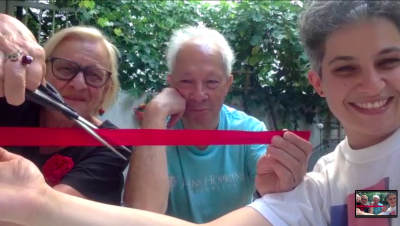
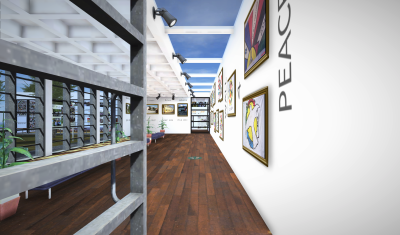
On June 24th, we opened the conference of the ambassadors of peace by opening our online museum. Without knowing what we were up to, Evelyn cordially opened up our exhibition, which aims to show and celebrate the great work that has been done so far. At the same time we will update this museu regularly, so do pay us a visit or two!
https://www.artsteps.com/view/628a69cc98afed24aeaac449
...The exhibition also includes an interactive time-line, to put the project in context, visit it here: https://histomania.com/app/?stories=3324
...And this text written by AnnPhie Fritz:
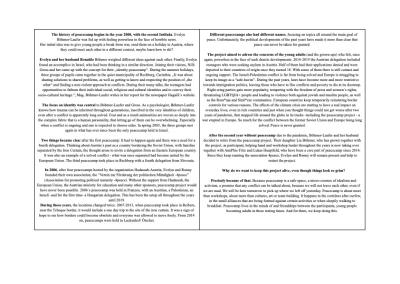

(0 Kommentare) ... comment
Conference of the Ambassadors of Peace
peacecamp, 09:56h
Calling ambassadors of peace!
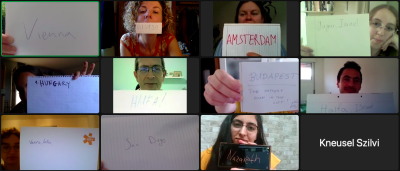
June 24th- June 26th 2022 was the date of our very first ambassadors of peace conference. The conference was meant to be a reunion for participants of peacecamps 2004-2019, as well as an invitations to youungsters interested in taking part in peacecamps to come from 2023 on.
Watch our trailer: https://youtu.be/pG85zakWbLY
We talked about the meaning of the title "ambassador of peace" and how we had put it to use ever since our respective peacecamp experiences, but also about difficulties we had encountered ever since, disappointments and frustrations with the political situation. We workshopped ideas of how to prepare participants better for a world after peacecamp, that doesn´t value peace a lot. We introduced the peacecamp-community network channel on discord, were young people can find each other and form teams of allies for their own projects. The aim is to use digital resources in order to create a support system that helps young people coordinate their efforts and actively participate in shaping their societies.
The ideas of digitalisation, participation, as well as working towards saving our planet both are all part of the European Year if Youth 2022. The European Union funds small projects all over Europe that aim to empower youth:
https://ejj2022.de/
We hope to make this conference a regular thing, to help keeping up the ambassadors of peace work beyond peacecamps and expand the network over past, present and future participants.

June 24th- June 26th 2022 was the date of our very first ambassadors of peace conference. The conference was meant to be a reunion for participants of peacecamps 2004-2019, as well as an invitations to youungsters interested in taking part in peacecamps to come from 2023 on.
Watch our trailer: https://youtu.be/pG85zakWbLY
We talked about the meaning of the title "ambassador of peace" and how we had put it to use ever since our respective peacecamp experiences, but also about difficulties we had encountered ever since, disappointments and frustrations with the political situation. We workshopped ideas of how to prepare participants better for a world after peacecamp, that doesn´t value peace a lot. We introduced the peacecamp-community network channel on discord, were young people can find each other and form teams of allies for their own projects. The aim is to use digital resources in order to create a support system that helps young people coordinate their efforts and actively participate in shaping their societies.
The ideas of digitalisation, participation, as well as working towards saving our planet both are all part of the European Year if Youth 2022. The European Union funds small projects all over Europe that aim to empower youth:
https://ejj2022.de/
We hope to make this conference a regular thing, to help keeping up the ambassadors of peace work beyond peacecamps and expand the network over past, present and future participants.
(0 Kommentare) ... comment
... older stories
